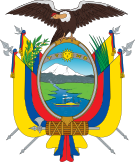| |||||||||||||||||
| |||||||||||||||||
| |||||||||||||||||
 |
|---|
Presidential elections were held in Ecuador in 1892. [1] The result was a victory for Luis Cordero Crespo of the Progressive Party , who received 58% of the vote. [1] He took office on 1 September. [2]
| |||||||||||||||||
| |||||||||||||||||
| |||||||||||||||||
 |
|---|
Presidential elections were held in Ecuador in 1892. [1] The result was a victory for Luis Cordero Crespo of the Progressive Party , who received 58% of the vote. [1] He took office on 1 September. [2]
| Candidate | Party | Votes | % | |
|---|---|---|---|---|
| Luis Cordero Crespo | Progressive Party | 36,557 | 58.14 | |
| Camilo Ponce Ortiz | Conservative Party | 26,321 | 41.86 | |
| Total | 62,878 | 100.00 | ||
| Source: TSE [1] | ||||